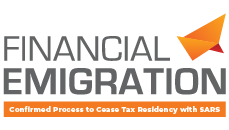EMIGRATING AT 55 PLUS? YOU STILL PAY TAX AND YOU’LL WAIT FOR YOUR RA
If you’re 55 plus and have emigrated or are intending to emigrate, you’ll still have to submit annual returns to SARS and pay tax on your worldwide income for the rest of your life.
“Depending on your situation, you can either reduce or eliminate your tax obligation, but only if you follow the correct processes,” says Melanie Browne, Financial Emigration Application Specialist at Tax Consulting South Africa’s Expatriate Taxation division.
In addition, new legislation prohibits you from encashing your retirement annuity until you are able to prove your non-tax residence status to SARS for a consecutive period of three years. This will come as a disappointment to those planning to fund their relocation with this payout.
Emigrating later in life
People 55 or over usually have mature financial portfolios. Perhaps the kids are out of the house and you’re making that final sprint towards funding your retirement.
For you, settling down in another country is best accomplished without getting deep into debt or taking out a big bond on a new home. So any and all cash is welcome.
But if you haven’t formally emigrated, SARS will still take its cut of your earnings, even if you already pay tax to a foreign government. Until you do, you will pay tax, you could be double taxed, and you won’t be allowed to draw from your full retirement annuity before maturity. In fact, you will need to wait for maturity to encash the one third lump sum and take out the remaining two thirds by way of a living annuity.
Options
The level of tax relief you can apply for depends very much on whether you intend to leave South Africa permanently or temporarily.
First, for anyone temporarily abroad and who is an employee, the first R1.25 million of their income is exempt from taxation. However, they must submit their annual returns to qualify for this exemption. Business and investment income is not exempt in terms of this particular exemption.
Second, those residing in a country with whom South Africa has a dual tax agreement may only end up paying one of the tax authorities. Again, submitting annual returns is a prerequisite.
Third, those departing permanently can pursue formal financial emigration with SARS. If they meet the requirements for non-residency for tax purposes and their tax affairs are in order, they can be free of their tax obligation to South Africa in respect of their foreign income and foreign assets.
“Apart from a person being able to draw from their RA after three years outside the country, banks continue to monitor the transfer of funds to foreign accounts by those who have not financially emigrated,” says Lovemore Ndlovu, Tax Consulting South Africa’s SARS and Exchange Control Specialist.
“It’s important to note that expatriates who have been abroad for several years can backdate their financial emigration application, reducing the RA waiting period by that time,” says Browne.
Professional help
It’s obvious that the options available and the processes involved are extremely complex. It’s therefore critical that prospective emigrants engage a professional advisor with good experience in expatriate tax matters.
They should also be supported by a strong legal function, that is, attorneys who specialise in the legal requirements of expatriate taxation.
“Having this level of guidance will help ensure your application is successful and you can live your new life with peace of mind,” says Browne.
AUTHORS

Lovemore Ndlovu
SARS and South African Reserve Bank Specialist




